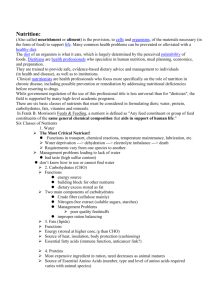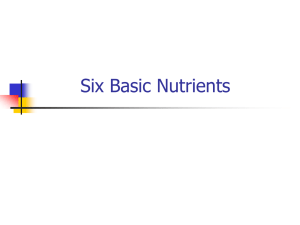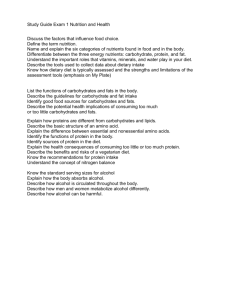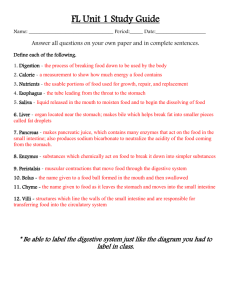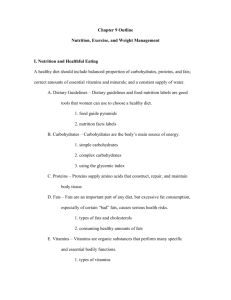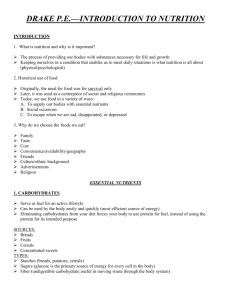PPT Nutrients handout
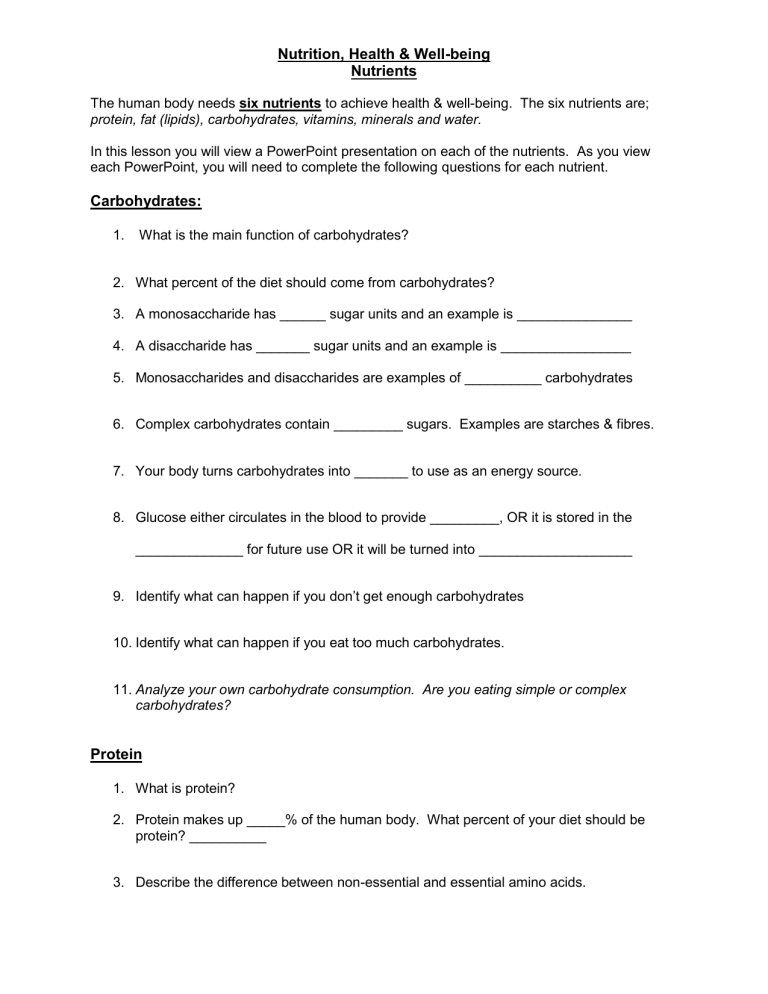
Nutrition, Health & Well-being
Nutrients
The human body needs six nutrients to achieve health & well-being. The six nutrients are; protein, fat (lipids), carbohydrates, vitamins, minerals and water.
In this lesson you will view a PowerPoint presentation on each of the nutrients. As you view each PowerPoint, you will need to complete the following questions for each nutrient.
Carbohydrates:
1. What is the main function of carbohydrates?
2. What percent of the diet should come from carbohydrates?
3. A monosaccharide has ______ sugar units and an example is _______________
4. A disaccharide has _______ sugar units and an example is _________________
5. Monosaccharides and disaccharides are examples of __________ carbohydrates
6. Complex carbohydrates contain _________ sugars. Examples are starches & fibres.
7. Your body turns carbohydrates into _______ to use as an energy source.
8. Glucose either circulates in the blood to provide _________, OR it is stored in the
______________ for future use OR it will be turned into ____________________
9. Identify what can happen if you don’t get enough carbohydrates
10. Identify what can happen if you eat too much carbohydrates.
11. Analyze your own carbohydrate consumption. Are you eating simple or complex carbohydrates?
Protein
1. What is protein?
2. Protein makes up _____% of the human body. What percent of your diet should be protein? __________
3. Describe the difference between non-essential and essential amino acids.
4. Identify three functions of protein a. b. c.
5. Why are plant based proteins healthy for you? Give an example.
6. Why are ani8mal based proteins healthy for you? Give an example.
7. Explain the difference between complete and incomplete proteins.
8. Give an example of a complimentary protein. Why are complimentary proteins a good food choice?
9. What three factors determine how much protein you need? a. b. c.
10. Should athletes consume large amounts of extra protein? Explain your answer.
11. Why do you think men eat double the amount of recommended protein?
12. Why is too much protein harmful for your body?
13. Why is protein deficiency more common in third world countries?
14. Are you eating too little or too much protein? How might this effect you in the future?
Fat
1. What is the name of the major fat found in our food?
2. Which is healthier saturate or unsaturated fatty acids? Why?
3. Why is hydrogenation bad?
4. Why do we not need cholesterol in our diet?
5. Identify three functions of lipids a. b. c.
6. Which of the following increases your risk of having a heart attack? LDL or HDL? Why?
Vitamins
1. Vitamins provide __________ energy or calories
2. Identify three functions in the diet a. b. c.
3. How many vitamins have been identified?
4. Vitamins are needed in _______ quantities in the human diet
5. Vitamin deficiency is caused _____________ or ______________
6. There are two categories of vitamins: water soluble and fat soluble. Provide examples for each and explain the difference.
7. Are you getting enough vitamins in your diet? Explain.
Minerals
1. Comprise ___________ total body weight
2. Minerals are needed in ___________ quantities in the human diet
3. There are _______________ known minerals
4. There are two groups of minerals: macro & micro. Provide examples of each & explain the difference
5. What function do minerals have in our diet?
Water
1. Which is more important for survival, water or food? Why?
2. Your body weight in water ________
3. Fat contains __________ of water
4. Muscle contains ________ of water
5. Identify three functions of water a. b.
6. Identify two sources of water c. a. b.
7. How is water lost?
8. Explain the effects of water loss.
